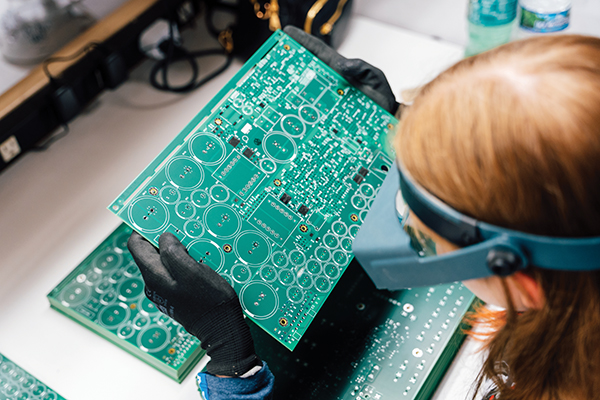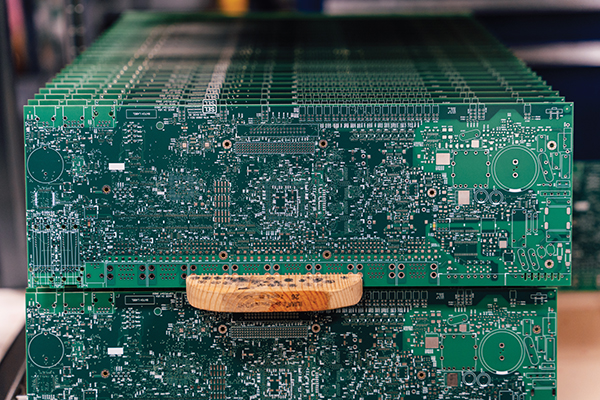
From the personal electronics we use each day to the automotive and health care industries, semiconductors play a critical role in our daily lives and the global economy. At the center of this thriving industry? Michigan. Computer and electronics manufacturing, including the semiconductor industry, contributes approximately $4.6 billion to Michiganís gross regional product.
Michigan is a top 10 state for overall employment in electronic component and semiconductor manufacturing; its semiconductor workforce has seen top 10 levels of growth in the last five years at 12 percent, with an expected increase to 15 percent for the next five years. In 2022, Michigan’s auto industry purchased over $40 million in products and services from semiconductor companies in Michigan. As the global hub of the automotive industry — the state is home to nearly one-fifth of U.S. auto production — Michigan has long been a customer of the semiconductor industry, affording it deep knowledge and expertise as it becomes a central hub for this booming sector.
Through strategic investments, educational partnerships and supportive policies, Michigan continues to enhance its leadership role in the semiconductor industry, contributing to both state and national economic growth. With an eye on the future of advanced technologies and onshoring supply chains, Michigan is positioned to be a cornerstone of America’s semiconductor future.
With a strategy guided by its “Make It in Michigan” plan, the state focuses on creating well-paying jobs and a skilled, talented workforce, and continuing to bring in projects that support its industries and communities. As part of this, the state pledged $500 million this year for the Strategic Outreach and Reserve (SOAR) Fund to attract and retain investments encouraging domestic development in key industries like clean energy, semiconductors and mobility. These investments, and the state’s legacy of automotive and manufacturing success, position Michigan as a leader in the next generation of the semiconductor industry.
Semiconductor Companies Are Shaping the Future in Michigan

Michigan’s commitment to and investments in the semiconductor industry’s success — and its stronghold at the heart of connected industries like automotive and manufacturing — make it a top state for semiconductor growth. Thanks to a supportive business ecosystem and talent solutions, leading semiconductor companies are building and growing in Michigan with a flurry of investments and expansions announced in recent years.
Hemlock Semiconductor, the largest producer of hyper-pure polysilicon in the U.S., received the state’s largest proposed investment from the CHIPS and Science Act in October 2024. The Saginaw-based manufacturer was awarded $325 million to build a new facility supporting 180 advanced manufacturing jobs and over a thousand construction jobs. The company also received $40 million from the Make It in Michigan Competitiveness Fund, an initiative specifically designed by the state to match federal grant opportunities.
The landmark deal demonstrates how years of careful groundwork enabled Team Michigan to move quickly when a once-in-a-generation opportunity emerged, thanks to the bipartisan work of its legislature, state departments and local development organizations.
“The U.S. needs a reliable source of polysilicon, which is the most critical component and material in semiconductors, and Hemlock has a decades-long presence in Michigan,” said U.S. Secretary of Commerce Gina Raimondo.
As a homegrown company with significant contributions to the semiconductor industry, Hemlock was also chosen as the site of Governor Gretchen Whitmer’s CHIPS Act executive directive signing in August 2022 aimed at boosting domestic chip manufacturing and remains a central anchor of the state’s industry.
Calumet Electronics Corp., the first company to build organic substrates in the U.S., is also enhancing its 35,000 square-foot manufacturing facility to scale production of high-density build-up substrates, crucial for the defense, aerospace engineering and electric vehicle (EV) industries. The investment in the Upper Peninsula will create 80 engineering jobs and further solidify the state as a leader in the semiconductor industry.
“MEDC [Michigan Economic Development Council], along with the Keweenaw Economic Development Alliance, has been very supportive of Calumet Electronics throughout this very critical process,” said Calumet Electronics Vice President and Chief Operations Officer Todd Brassard at the time of the announcement. “We are committed to continue advancing Michigan’s role in electronics manufacturing.”
Meanwhile, Silicon Valley-based KLA chose Michigan over 350 other locations to build its R&D semiconductor research center and second U.S. headquarters. KLA chose the state for its attractive business climate, logistical assets and rich talent base. Soon after the commitment, the company more than doubled the original expected investment to more than $200 million and increased its commitment from 500 to 600 high-tech, high-wage jobs.
“When we announced KLA’s plans for bringing our second North American headquarters to Michigan, we knew it was going to be an exceptional place to expand our R&D programs and develop a new AI center of excellence to continue solving complex customer problems,” said KLA Chief Strategy Officer Bobby Bell.
In July 2021, semiconductor wafer manufacturer SK Siltron announced plans for a $300 million expansion of operations in Bay County to produce silicon carbide wafers for semiconductors, creating up to 150 jobs. In September 2022, the company celebrated the ribbon cutting of the new facility, where they are further strengthening the state’s semiconductor supply chain.
“SK Siltron CSS is thrilled to expand our presence in Michigan and reinforce our commitment to the entire Bay City community, while creating high-paying jobs and new investment opportunities,” said Jianwei Dong, CEO of SK Siltron CSS, at the 2022 ribbon cutting. “This significant investment in Bay City will further boost the confidence levels of not only our customers, but also the entire electrical vehicle value chain to accelerate the pace of EV adoption.”
As companies in the semiconductor industry continue to invest in the state, they contribute to the steady momentum building over the years that makes Michigan well-suited to house the industry’s future.
Building a Semiconductor Talent Pool

Given this influx of investments by global semiconductor companies, it comes as no surprise that Michigan has the fifth-largest advanced manufacturing workforce in the country and is helping small to medium-sized manufacturing companies adopt and transition to advanced technologies, like semiconductors for EV batteries. To do this, Michigan has formed strategic partnerships and invested in education initiatives to further set itself — and its workforce — apart.
In 2022, the state joined the SEMI Foundation, an organization supporting economic opportunity for workers and the sustained growth of the microelectronics industry, investing $3 million for the Semiconductor Career and Apprenticeship Network (SCAN) in Michigan to create a pipeline of well-paying industry jobs. Announced in May 2022, the SCAN program is an initiative aimed at creating pathways and opportunities for job seekers and tools and systems for semiconductor companies to attract, develop and retain a diverse, innovative and skilled workforce.
A year later, Michigan established the Semiconductor Talent and Technology for Automotive Research (MSTAR) initiative to create a global semiconductor center of excellence. The MSTAR initiative is a public-private partnership with semiconductor company KLA, technology innovation hub Imec, the University of Michigan, Washtenaw Community College and General Motors. In June 2024, the state announced a $10 million investment in MSTAR with the goal of making Michigan the world’s leader in automotive semiconductor technology and talent development. As the global hub of the automotive industry, Michigan has long been a customer of the semiconductor industry, affording it deep knowledge and expertise.
Similarly, the MEDC has invested $3.8 million in grants with $600,000 in matching funds to support eight local higher education institutions’ semiconductor education and training programs to help build the workforce needed as the industry grows. Some of the recipients include:
• Delta College, which will use the funding for both adult learners looking to expand their skills or change careers and middle- and high-school students with STEM exploration programs.
• Lansing Community College, which is launching a boot camp for entry-level semiconductor technician roles.
• Michigan Technological University, which plans to expand its semiconductor education and training programs across the state’s Upper Peninsula.
In 2022, Governor Whitmer and the MEDC launched the Talent Action Team, which works across public sector, industry partners and training institutions to develop a workforce that helps attract long-term, sustainable investments from high-tech companies around the world. With a focus on the EV and semiconductor industries, the work of the Talent Action Team places Michigan in a strong position to attract investments from global semiconductor companies. Through these talent initiatives, Michigan is emerging as a leader in semiconductor talent development, ensuring a skilled talent pool prepared to meet the evolving needs of the industry.
Thanks to a strong commitment to innovation, along with a historic foundation in automotive and manufacturing, it is clear why leading semiconductor companies and prospective talent are choosing Michigan to grow and shape the future. To learn more about why companies are choosing to Make It in Michigan, visit michiganbusiness.org/pure-opportunity. T&ID

